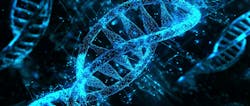Cancer is typically thought to develop after genes gradually mutate over time, finally overwhelming the ability of a cell to control growth. But a new closer look at genomes in prostate cancer by an international team of researchers reveals that, in fact, genetic mutations occur in abrupt, periodic bursts, causing complex, large scale reshuffling of DNA driving the development of prostate cancer.
In a recent issue of the journal Cell, scientists, led by researchers from Weill Cornell Medical College, the Broad Institute, Dana-Farber Cancer Institute, and the University of Trento in Italy, dub this process “punctuated cancer evolution,” akin to the theory of human evolution that states changes in a species occur in abrupt intervals. After discovering how DNA abnormalities arise in a highly interdependent manner, the researchers named these periodic disruptions in cancer cells that lead to complex genome restructuring “chromoplexy.”
The discovery of “chromoplexy” came after the research team worked collaboratively to sequence the entire genomes of 57 prostate tumors and compared those findings to sequences in matched normal tissue. Researchers then tracked how genetic alterations accumulated during cancer development and progression. They used advanced computer techniques to identify periodic bursts of genetic derangements. The researchers also report that future targeted cancer therapy may depend on identifying complex sets of genetic mutations and rearrangements in each patient. Read the article abstract, with figures.





